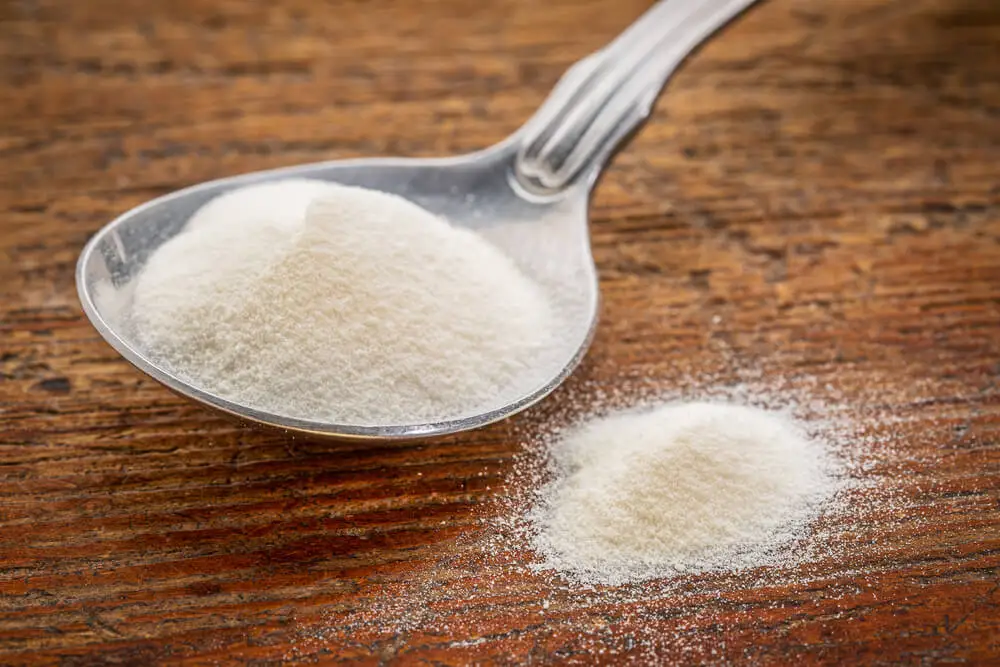The Risks of Collagen Supplements


Reviewed and approved by the pharmacist Franciele Rohor de Souza
Collagen supplements help reverse the natural loss of collagen in the body as a result of the passage of time. However, they must first be prescribed by a medical specialist.
Collagen is the most abundant protein produced by the human body. Collagen has a structure in the form of fibers to give consistency to the epidermis, hair, bones, tendons, cartilage, and teeth. In addition, it’s also found in the tissue that surrounds and protects muscles and internal organs.
Supplements are mainly used in the prevention and treatment of conditions related to the joints, bones, and skin. However, they do have some risks… Do you want to know what they are?
Types of collagen supplements
According to the results of research published by the Journal of Drugs in Dermatology, the benefits of collagen supplements for wound healing and skin elasticity are becoming increasingly convincing.
In this line and with prior medical approval, you can find them in different presentations:
- Capsules, liquids, or powders that can be taken orally.
- Protein bars and coffee creams enriched with collagen. These are some of the newest supplements.
- Collagen creams. They help prevent and smooth wrinkles.
We think you may also enjoy reading this article: 10 Beauty Treatments that Can Regenerate Skin Collagen

However, they are also available in injections.
- Collagen njections firm and improve the overall appearance of the skin. In addition, they have been shown to last up to 12 weeks.
The uses of collagen supplements
The use of collagen supplements has become popular in recent years. Its benefits range from relieving joint pain to improving skin health. Similarly, some of the more well-known benefits include the following:
- It delays aging and prevents the appearance of wrinkles.
- It improves the elasticity and turgor of the epidermis.
- Collagen strengthens the hair and nails.
- It reduces stiffness and discomfort in the joints.
- It blocks bone breakdown and decreases the risk of osteoporosis.
- Collagen prevents loss of muscle mass.
- It improves cardiovascular health.
Who shouldn’t take collagen supplements?
In general, anyone can take this type of supplement with a prior prescription and under progressive surveillance.
However, you should be aware of the contraindications of collagen and, in turn, that there are certain risks if you take a higher dose than recommended.
If you take supplements or medications with calcium
If you take calcium, try to avoid the intake of marine collagen.
As a study developed at the University of Sonora and published by the Journal of Biological and Health Sciences explains, this protein is extracted from cartilage and bones, so supplements already contain enough calcium. For this reason, if you combine it with supplements, you can suffer hypercalcemia with symptoms such as:
- Bone pain
- Fatigue: This is due to the fact that, as calcium accumulates in the blood, red blood cells take longer to transport oxygen to the different parts of the body
- Vomiting and diarrhea
- Irregular pulse: The pulse changes because the heart has to work harder to pump blood
Pregnancy and breastfeeding
Pregnant or breastfeeding women should consult with their doctor about whether or not it’s advisable for them to take supplements.
Also, it’s preferable that those of collagen (in case they’re advised) are pure to avoid harmful substances. And, in addition, that they belong to bovine sources since fish and seafood have a higher risk of producing allergies.
Like this article? You may also like to read: The 8 Foods that Provide the Most Collagen for Your Skin
The side effects of collagen supplements
While a topical application of collagen is relatively safe, other presentations can produce side effects. However, these side effects are rare and are not associated with serious problems.
In fact, a study conducted on an oral collagen supplement and published in the Journal of Medicinal Food showed that none of the people developed adverse effects.
Gastrointestinal problems
According to the results of a study conducted in 2016 by several researchers at the Center for Musculoskeletal Health (University of California), out of 191 volunteers, 14 developed gastrointestinal problems from taking collagen supplements.
Although this side effect is rare, there’s a possibility that it may occur in some cases.

These symptoms include diarrhea or constipation, heartburn, and a feeling of a full stomach.
Bad taste in the mouth
Most collagen supplements are tasteless, but because some of them originate from seafood, they tend to have a strong aftertaste and odor. This causes a bad taste in the mouth after ingesting them.
Skin conditions
Although it does not usually occur and there is not enough scientific evidence, there may be people who, taking collagen supplements, present skin conditions due to an allergic reaction not previously consulted with the doctor.
Some people have reported suffering severe episodes of acne when starting the intake of certain collagen supplements. However, there’s no scientific evidence associating collagen itself with such episodes. This is because the products usually contain other elements such as biotin, whey, or hyaluronic acid, which may be responsible.
Collagen supplementation is also associated with the appearance of scleroderma. This is a disease in which the body produces collagen excessively, causing multiple symptoms such as joint stiffness and pain. However, there is no scientific basis for this relationship, since the body effectively regulates the excess of this protein.
Allergic reactions
Depending on the source of extraction, there may be a greater risk of suffering an allergic reaction.
As an article published in the Nutrition and Health Magazine details, fish, seafood and eggs are the foods most commonly used as sources of extraction. In this case, allergies are not in themselves contraindications of collagen; but of its origin.
Which collagen supplements to choose
When taking collagen supplements, opt for hydrolyzed collagen. Hydrolyzed collagen undergoes a treatment to break the protein into smaller particles, thus improving its absorption.
This is a suitable supplement to take in the long term, indicated to prevent and treat chronic degenerative diseases (osteoarthritis and osteoporosis), as well as to prevent and attenuate dermal aging.
In addition, always make sure to choose pure versions, since some include chemicals and other ingredients to improve their texture and facilitate their absorption without resorting to the hydrolyzation process. These added extra substances may have their own contraindications.
You should also take into account the source of extraction, especially if you have any food allergy or suspect you may have one.
When in doubt about whether to take collagen or not, it’s always best to consult a specialist
Over the years, the body loses the ability to produce collagen. So one resorts to supplements to slow the aging of the skin and strengthen bones and joints.
However, as you’ve seen in this article, there are cases in which side effects occur. That’s why it’s always best to consult a professional first. He or she will perform the necessary tests for you to be able to take them safely.
All cited sources were thoroughly reviewed by our team to ensure their quality, reliability, currency, and validity. The bibliography of this article was considered reliable and of academic or scientific accuracy.
- Basés Pérez, E. (2015). REVISIÓN DE LOS EFECTOS BENEFICIOSOS DE LA INGESTA DE COLÁGENO [JB]. NUTRICION HOSPITALARIA, 1, 62–66. https://doi.org/10.3305/nh.2015.32.sup1.9482
- Bolke, L., Schlippe, G., Gerß, J. y Voss, W. (2019). Un suplemento de colágeno mejora la hidratación, elasticidad, aspereza y densidad de la piel: resultados de un estudio ciego, controlado con placebo y aleatorizado. Nutrientes, 11 (10), 2494. https://doi.org/10.3390/nu11102494
- Choi, F. D., Sung, C. T., Juhasz, M. L. W., & Mesinkovsk, N. A. (2019). Oral Collagen Supplementation: A Systematic Review of Dermatological Applications. Journal of Drugs in Dermatology : JDD, 18(1), 9–16. https://pubmed.ncbi.nlm.nih.gov/30681787/
- Czajka, A., Kania, E. M., Genovese, L., Corbo, A., Merone, G., Luci, C., & Sibilla, S. (2018). Daily oral supplementation with collagen peptides combined with vitamins and other bioactive compounds improves skin elasticity and has a beneficial effect on joint and general wellbeing. Nutrition Research, 57, 97–108. https://doi.org/10.1016/j.nutres.2018.06.001
- García-Coronado, J. M., Martínez-Olvera, L., Elizondo-Omaña, R. E., Acosta-Olivo, C. A., Vilchez-Cavazos, F., Simental-Mendía, L. E., & Simental-Mendía, M. (2019, March 14). Effect of collagen supplementation on osteoarthritis symptoms: a meta-analysis of randomized placebo-controlled trials. International Orthopaedics. Springer Verlag. https://doi.org/10.1007/s00264-018-4211-5
- Ito, N., Seki, S. y Ueda, F. (2018). Efectos del suplemento compuesto que contiene péptido de colágeno y ornitina sobre las afecciones de la piel y los niveles de IGF-1 en plasma: un ensayo aleatorizado, doble ciego y controlado con placebo. Drogas marinas, 16 (12), 482. https://doi.org/10.3390/md16120482
- Kim DU, Chung HC, Choi J, Sakai Y, Lee BY. (2018). Oral Intake of Low-Molecular-Weight Collagen Peptide Improves Hydration, Elasticity, and Wrinkling in Human Skin: A Randomized, Double-Blind, Placebo-Controlled Study. Nutrients. 2018;10(7):826. Published 2018 Jun 26. doi:10.3390/nu10070826
- Ramírez-Guerra, H., Ramírez-Suárez, J. y Mazorra-Manzano, M. (2013). PROPIEDADES BIOLÓGICAS DE PÉPTIDOS DERIVADOS DEL COLÁGENO DE ORGANISMOS MARINOS. BIOtecnia, 15 (3), 34. https://doi.org/10.18633/bt.v15i3.156
- Silva, T. F. da, & Penna, A. L. B. (2012). Colágeno: Características químicas e propriedades funcionais. Revista Do Instituto Adolfo Lutz.
- Straub, DA (2007). La suplementación de calcio en la práctica clínica: una revisión de formas, dosis e indicaciones. Nutrición en la práctica clínica, 22 (3), 286-296. https://doi.org/10.1177/0115426507022003286
This text is provided for informational purposes only and does not replace consultation with a professional. If in doubt, consult your specialist.








